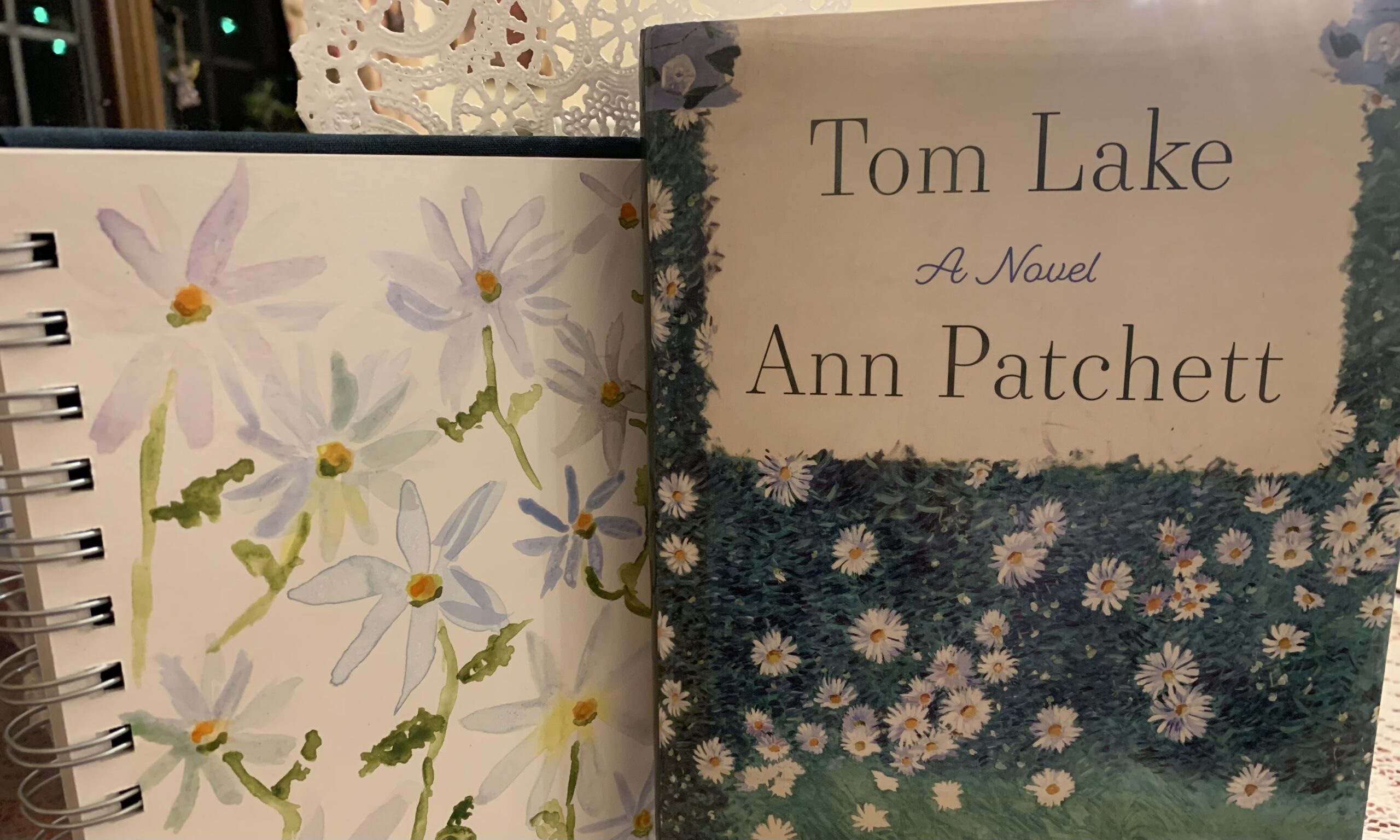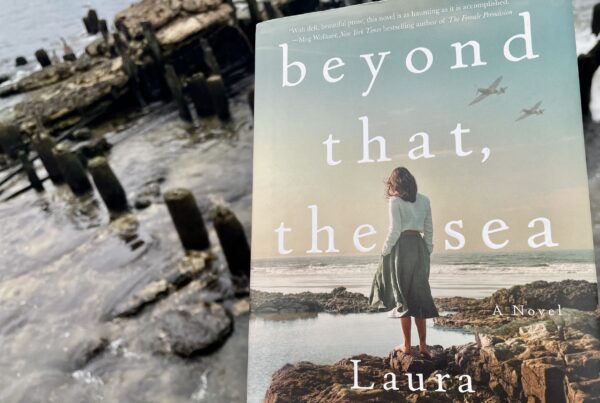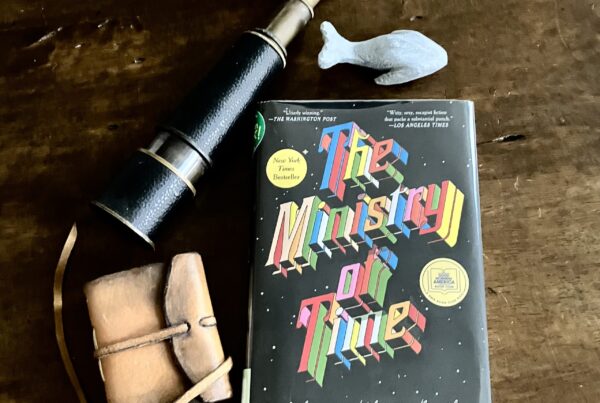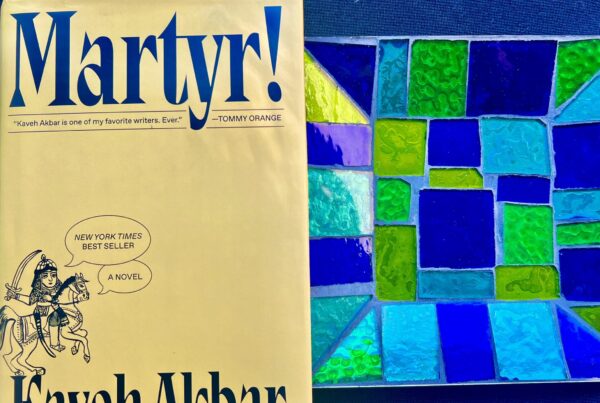Sometimes, it’s harder to review a novel you love than it is to tell about one you just liked. I loved Tom Lake.
I had hesitated to read it. Too many people told me I had to read it—the same people who said I had to see the movie Theatre Camp because my husband and I ran a summer theatre program for many years. While I enjoyed the film, I did not adore it. So, I picked up Ann Patchett’s daisy-strewn hardback with some trepidation. It lived up to my high expectations.
Against the backdrop of the pandemic, Lara narrates to her own three young adult daughters, Emily, Maisie and Nell, the story of a summer stock season when she played Emily in Our Town. The story is bounded by the cherry season—an intense, laborious time during which the whole family must work to harvest the crop. Their livelihood depends on their success. Lara spools out the story, finally sharing with her girls the details of that summer and her own coming-of-age as a young woman who left the theatre.
In a sense, the core of the novel is Lara’s experience with Our Town. She plays Emily in high school, again in college, and then in summer stock at Tom Lake until she ruptures her Achilles tendon and never acts again. What happens next is Lara’s life with her husband Joe and their three daughters, all of whom are home on the family cherry farm in Michigan because of Covid. Lara’s narration moves seamlessly between her girlhood and the present. We know that we are in deft hands: as in any good theatrical production, Patchett has created a world and invites us to join her in it.
The story moves from a gymnasium in New Hampshire to Los Angeles to a season of summer stock to a cherry farm in Michigan and, curiously, also transported me through time from my own girlhood spent in theatre to now a mother of adult daughters. Patchett gave me Wilder’s play in a new way, and her extraordinary storytelling—conversational, specific, with the scenic detail of a film and the pacing of the best kind of fiction—drew me in instantly.
Less than a page in, I felt as if I’d been dropped into Lara’s life. I knew her. To be clear, I have never been an aspiring actress in Los Angeles nor had a fling with an matinee-idol handsome actor in summer stock, but I do know a fair amount about theatre. I know the intoxication of becoming close to a group of actors, the way a day can feel like a week, the way the outside world drops away. I’ve never lived on a Michigan cherry farm, but the way Patchett described the hard work required, the “all hands on deck” relentless labor made me want to wash cherry juice off my own fingers. I felt as though I was in the orchard during hot summer days, in the drafty house during winter.
Lara and Joe’s three daughters are almost adults: Emily, named for Emily in Our Town is the oldest, and it is she who will keep the farm going. Maisie is on her way to becoming a vet until the pandemic interrupts her training. And dreamy Nell, perhaps the kindest of the three to her mother, dreams of being an actress. The three girls are on the cusp of adulthood, yet Patchett evokes them at every age. We are privy to their habits—braiding their hair together, dressing by the stove, watching Duke’s old films—and understand them both as a unit and as individuals. Every detail of this novel—Lara’s fancy bathing suit purchased by an assistant in Los Angeles for a swimming screen test; the long dancer legs of Pallace, Lara’s friend and foil at Tom Lake; the drunken but dear man who plays the Stage Manager; the blue linen napkins Lara buys when she and Duke and Pallace visit Joe’s Aunt Maisie; the way the two family dogs behave; the cottage where Emily and her beau live; Duke’s relationship with his tennis pro brother; the drama of summer stock romance; the daisies in the family cemetery on a hilltop; the ache of watching our children seek their own paths—felt deliciously familiar and right, as if I were in the book with the characters, half witness, half participant. I did not want it to end.
Granted, I am a life-long drama teacher with a particular love for Our Town. As a sophomore in high school, I was the Woman in the Balcony, inquiring of Editor Webb if there was much drinking in Grover’s Corners. I understudied all the other women in the cast; I fell in love with the play, and it sealed my intention to make theatre a part of my life forever. Twice, I’ve directed the play. I’ve taught it in English classes more times than I can count. In high school, I had a crush on the boy who played George. Now, I have a crush on Tom Lake.
As soon as I finished the book, I downloaded it onto Audible and listened to Meryl Streep perform it. She is a wonder, inhabiting Lara’s character at all ages. I can’t help imagining that she and Ann Patchett should be friends, and I wish I could be invited to join the two of them for tea in Patchett’s bookstore. I suspect I will listen to the novel again before long.
Though I first read Tom Lake several months ago, I am still thinking about it as I look out the kitchen window, drive to the grocery store, fall asleep at night. Great books can take us places we’ve never seen or imagined. They can also evoke places and memories that remind us of our own lives, hold up a sort of mirror that prompts us to reflect on loss, joy, fear—universal experiences that are particular, too. In Tom Lake, I discovered Lara and Joe’s story, fell in love with their family and their lives, and felt such gratitude at the opportunity to reflect anew on my own deep love for Our Town, for theatre, and for mothering.
At the end of Thornton Wilder’s play, Our Town, the Stage Manager explains. “We all know that something is eternal. And it ain’t houses and it ain’t names, and it ain’t earth, and it ain’t even the stars . . . everybody knows in their bones that something is eternal, and that something has to do with human beings.” Tom Lake might just fall into the eternal category for me.




